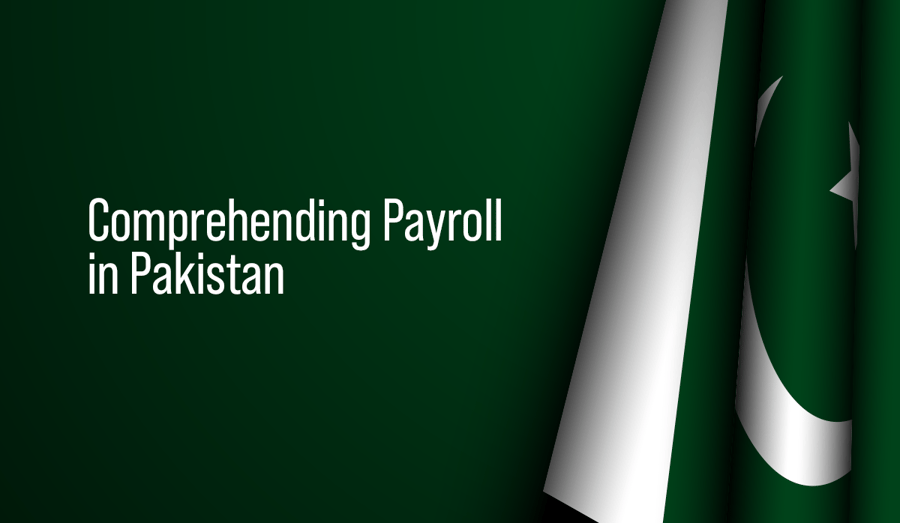
- Home
- Global Payroll
- Employment Laws & Payroll Compliance in Pakistan
Employment Laws & Payroll Compliance in Pakistan
Employment Laws & Payroll Compliance in Pakistan
18:54
Published :

Pakistan is a multi-ethnic country of South Asia and the world's fifth-most populous country, with a population of almost 243 million people. Its capital is Islamabad, in the foothills of the Himalayas in the northern part of the country, and its largest city is Karachi, in the south on the coast of the Arabian Sea. Pakistan encompasses a rich diversity of landscapes, starting in the northwest, from the soaring Pamirs and the Karakoram Range through a maze of mountain ranges, a complex of valleys, and inhospitable plateaus, down to the remarkably even surface of the fertile Indus River plain, which drains southward into the Arabian Sea. Here’s a detailed round up of all payroll compliance requirements and regulations, a crucial aspect of payroll services.
In Pakistan, the Income tax is governed by Income Tax Ordinance, 2001 which has been replaced recently by Income tax ordinance amended up to June 30, 2022 (The Ordinance). In this section, the provisions related to Taxation of Employment Income has been discussed.
The tax year in Pakistan runs from July 01 to June 30 and it is denoted by stating the calendar year in which the end date falls i.e., in case of tax year July 01, 2022 to June 30, 2023 it will be denoted as calendar year 2023.
The Ordinance defines the criteria for considering an individual residential status as follows:
Despite the mention of the criteria to determine the residential status of individuals the tax rates and other provisions for salaried individuals remains the same for both Resident and Non-Resident category.
Employer is under an obligation to withhold taxes from the employee’s salary income every month based on the average salary earned during the tax year, at the below tax slab rates applicable 2022:
|
Annual taxable income (in PKR) |
Tax Amount (in PKR) |
Tax Rate on excess income |
|---|---|---|
|
0-600,000 |
- |
0.00% |
|
600,001-1,200,000 |
- |
2.50% |
|
1,200,001-2,400,000 |
15,000 |
12.50% |
|
2,400,001-3,600,000 |
165,000 |
20.00% |
|
3,600,001-6,000,000 |
405,000 |
25.00% |
|
6,000,001-12,000,000 |
1,005,000 |
32.50% |
|
>12,000,000 |
2,955,000 |
35.00% |
Employees while filing their Personal Income Tax return will need to review the applicable tax slabs depending on whether their employment income constitutes of less than 75% of their total income or not. Different tax rates, as provided in Schedule 1 Part 1 of The Ordinance, will be applicable if they don’t meet the criteria of having employment income above 75% of the total income.
The employment income in Pakistan comprises of Gross salary, perquisites, deductions, reliefs, and tax credits. The taxable income of an individual is determined by adding the taxable perquisites and deducting the eligible allowances as well as tax credits from gross salary. The details of such components are explained briefly below:
The gross salary includes basic pay, wages or other remuneration provided to an employee, including leave pay, payment in lieu of leave overtime payment, bonus, commission, fees, gratuity, or work condition supplements for unpleasant or dangerous working conditions.
Any benefits in cash or kind provided by the employer to its employees shall be included as part of the employee’s salary in the tax year.
Some of the taxable perquisites are as follows:
The following perquisites are exempt from tax:
The amount paid in a tax year for the list of items below can be claimed as a tax deduction:
Employees can claim tax credit for the payments as provided below.
The eligibility criteria and tax credit amount differ based on nature of payment
All employees engaged in any professional, trade calling or employment are required to pay Professional Tax. Employer withholds professional tax from salary and is remitted to District Excise and Taxation Officer. This varies based on the province and nature of professional work undertaken.
.jpg?width=760&height=398&name=Shutterstock_2148679221%20(1).jpg)
Every employer is under an obligation to deduct tax before remitting the salary to employees and must deposit the tax deducted under various sections of the Ordinance, within 7 days of the end of the week in which the payment has been made. To deposit the taxes into government treasury, a payment challan i.e., PSID needs to be created. This is an integral part of the payroll system in Pakistan.
There is also an obligation to electronically file bi-annual income tax withholding statement on July 31 and January 31 for the period January to June and July to December respectively in Iris Portal. Also, employers must furnish annual employer statement by September 30 every year and issue certificate of collection or deduction of tax within 45 days of the end of the tax year.
|
Reason of default |
Amount of penalty |
|---|---|
|
Failure to withhold income tax on time |
Ø PKR 40,000 or 10% of income taxes outstanding, whichever is higher |
|
Failure to declare tax returns on time |
Ø 0.1% of tax payable in respect of the year for each day of default or PKR 1,000 for each day of default whichever is higher, Ø with a minimum penalty of PKR 10,000 and a maximum penalty of 200% of taxes outstanding. Ø Depending on the return filing date withing 1, 2 or 3 months after the due date or extended due date of filing of return, the amount of penalty shall be reduced by 75% or 50% or 25% |
Following labour laws are applicable to provide social protection to employees in different forms:
To safeguard the interest of old aged employees further, the Federal government of Pakistan enacted another regulation know as Employees' Old Age Benefits Act, 1976, (Act No XIV of 1976) (‘EOBI Act’).
EOBI Act social Insurance scheme is administered at Federal level, which is mandatory for all industry or commercial establishment with 5 or more employees and voluntary in other cases. It extends following benefits to insured persons:
The rate of contribution applicable is 6% i.e., 5% for employer and 1% for employee on the wages notified under the Minimum Wages for Unskilled Workers Ordinance, 1962 and will vary from province to province.
Apart from the above there is Employee’s Social Security Contribution (ESSI) that is applicable as per the Provincial Employees Social Security Ordinance, 1965 and is administered by autonomous provincial bodies called Employee’s Social Security Institute of a particular province. The rate of contribution, minimum and maximum contribution capping also varies based on each province.
Every employer has an obligation to declare EOBI return i.e., Form PR-02 to the Institution quarterly in respect of each month of the relevant quarter, within 15 days of the end of the quarter to which it relates with full particulars of every person in his insurable employment accompanied by receipted copies of the Contribution Payment Slips in Form PR-03.
ESSI payments should be remitted on last day of every month for salaries paid in the previous month and monthly returns should be declared by 30th of the following month.

|
Reason of default |
Amount of penalty |
|---|---|
|
Overdue payment of EOBI contributions |
2% of the amount payable assessed for every month, or part of a month of failure up to a maximum of 50% of amount payable |
|
Overdue payment of ESSI contributions |
0.5% of taxes outstanding per day of failure for the first 90 days. After 90 days the fine is increased to 50% of taxes outstanding. |
Employment laws considerations are quite crucial for the smooth functioning of an organisation. It provides for all the necessary obligations and guidelines from both employer and employee perspective right from entering into an employment contract till departure. Below are some of the noteworthy labour law compliances for Pakistan.
The Standing Orders Ordinance 1968 requires all the employers to provide every worker an employment contract before the beginning of work and be made as clear as possible by standardizing all the contracts to reflect official currency, the Pakistani Rupee (PKR).
Companies with 20 employees or more must have formal written business contracts with employees, stating the compensation, bonuses, and working hours of each employee.
Probationary periods are allowed in the private sector but should last no longer than six months. Collective bargaining is also allowed in Pakistan, though the government places strict regulations on the rights of employees to strike. There is an obligation for both the employer and employee to provide one month notice before terminating the employment contract.
The standard working hours for a full-time employee are 48 hours i.e., 6 days a week for 8 hours per day, any time worked beyond that qualifies as overtime and is compensated at 200% of the regular wage.
The minimum wages are set as per Minimum Wages Ordinance, 1961 by the Minimum Wage Boards and applies to all the industries wherein the employees are categorized as Highly skilled, Semi-skilled, unskilled, apprentice and domestic workers. As it varies province wise detailed notifications and circulars will be issued by the respective provincial labour departments.
In the case of termination for any reason besides misconduct on the part of the employee, employers will need to provide written notice of termination as well as severance pay. Employees receive one-month wages for every year they have served the company.
Employees are eligible for below mentioned statutory leaves and it may vary based on nature of work and Acts of respective province:
In addition to social security and leave benefits discussed above there are other benefits namely retirement benefits i.e., gratuity and provident fund provided to employees under Standing Orders Ordinance 1968. Legally there are no provisions to insist on if the employer has to provide either of these benefits or both the benefits simultaneously. It depends on employer's discretion to decide either to grant provident fund or gratuity or both the benefits voluntarily at the end of employment. The taxability aspects of the benefits are as follows:
1. Provident fund (PF)
Any amount received by an employee from a recognised PF shall be treated as exempt from tax.
However, annual contribution of the employer made to the approved/recognised pension fund shall be treated as income received by the employee during the year if
(a) contributions made by the employer are more than one-tenth of the salary or Rs.150,000 of the employee, whichever is low; and
(b) interest earned on the balance of PF that exceeds one-third of the salary of employee.
2. Gratuity
An employee is eligible for Gratuity in case of retirement or death for the services rendered previously during employment. Such income is exempt as follows
As businesses in Pakistan continue to expand across industries and geographies, the need for advanced payroll services supported by automation and technology has become increasingly important. Traditional manual processes are often prone to errors and compliance risks, whereas an automated payroll system ensures accurate calculations, timely filing, and adherence to ever-evolving regulatory requirements. Companies are now transitioning toward digital payroll models that integrate with HR systems, employee portals, and accounting platforms, creating a unified ecosystem for workforce management.
An automated payroll system significantly reduces the risk of non-compliance by incorporating tax rules and statutory updates directly into the software. With real-time monitoring, digital payroll services can automatically adjust contributions, generate reports, and ensure timely submission of returns. This minimizes administrative burden and allows HR and finance teams to focus on strategy rather than repetitive administrative tasks.
The adoption of cloud-based payroll services in Pakistan has seen consistent growth due to scalability, accessibility, and data security features. Cloud-enabled platforms provide centralized control, enabling organizations to manage payroll across multiple provinces while ensuring compliance with regional tax slabs and social security obligations. Additionally, modern payroll systems offer advanced data encryption and multi-factor authentication to protect sensitive employee information.
Beyond compliance, a well-implemented payroll system plays a strategic role in workforce retention and operational transparency. Detailed payroll analytics help organizations predict labor costs, optimize budgeting, and evaluate performance indicators. Businesses that invest in advanced payroll services can also enhance employee satisfaction through timely payments, clear payslips, and easy access to benefit statements via employee self-service portals.
By embracing automation and leveraging a robust payroll system, businesses in Pakistan can streamline their operations, reduce compliance risks, and create a future-ready payroll infrastructure aligned with global best practices.
Looking to stay on top of all compliance related updates? Check out our exclusive compliance portal with real-time updates on Payroll related statutory changes for Pakistan and 60+ countries. Subscribe for free to never miss a compliance related update!
Key employment contract requirements in Pakistan include clearly defining the employee’s role, job responsibilities, salary structure, benefits, working hours, probation period, termination clauses, and statutory obligations such as EOBI and ESSI contributions. Written contracts help businesses ensure compliance with Pakistan payroll regulations, protect employee rights, and reduce legal disputes. Properly documented contracts also simplify payroll processing and statutory reporting.
Under Pakistan payroll compliance, the statutory working hours are generally 8 hours per day and 48 hours per week, with overtime paid for additional hours as mandated by the Payment of Wages Act, 1936. Employers must calculate overtime accurately and include it in the payroll system to avoid penalties. Automated payroll systems help track working hours and ensure compliance with overtime rules across all provinces in Pakistan.
Employees in Pakistan are entitled to various statutory leaves under labor laws, including:
Accurate leave tracking is a critical part of Pakistan payroll compliance, as unpaid or incorrectly calculated leave can lead to non-compliance penalties. Payroll systems can automate leave accruals and integrate them with salary calculations.
In Pakistan, provident fund and gratuity benefits are considered part of the employee’s employment income and are taxed according to the Income Tax Ordinance 2001. Employers must include contributions in the payroll calculation, apply relevant tax deductions, and ensure reporting through the monthly and annual withholding statements. Maintaining a compliant payroll system ensures correct taxation of these benefits under Pakistan payroll compliance requirements.
Payroll automation helps businesses stay compliant in Pakistan by streamlining income tax withholding, EOBI and ESSI contributions, overtime calculations, leave management, and statutory reporting. Automated payroll systems reduce human errors, generate accurate reports, and ensure timely submissions to government authorities. Adopting payroll software is a best practice for businesses aiming to maintain full Pakistan payroll compliance and enhance operational efficiency.
Employers in Pakistan must comply with reporting obligations under Pakistan payroll compliance, including monthly tax deduction deposits, bi-annual income tax withholding statements, and annual employer statements. Proper reporting ensures accurate Income Tax, EOBI, and ESSI contributions, avoids penalties, and maintains transparency for audits. Automated payroll systems help generate and submit these reports on time.
Non-compliance with Pakistan payroll compliance can result in financial penalties, interest charges, legal disputes, and reputational damage. Failure to deposit taxes, EOBI, or ESSI contributions on time, or misreporting employee income, can trigger inspections and audits by authorities. Businesses benefit from automated payroll systems that reduce errors and ensure adherence to all statutory requirements.
Managing multi-province payroll compliance in Pakistan requires understanding varying rules for ESSI contributions, professional tax, and minimum wages in each province. Centralized payroll systems automate calculations, track provincial differences, and ensure accurate reporting. This simplifies Pakistan payroll compliance for businesses operating across multiple regions.

All Rights Reserved. © Copyright 2024. Ramco Systems.